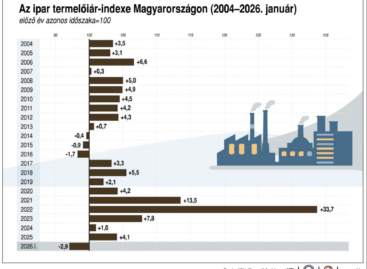GKI article in the EU: 20 years of change
Are we falling behind the Visegrád countries, or are we on the way? Has Romania really overtaken us? On May 1, we will celebrate the 20th anniversary of our accession to the EU, which is an excellent opportunity to examine how Hungary’s situation has changed compared to regional countries with a similar historical, social and economic background.
Between 2004 and 2023, the value of GDP/capita calculated on the basis of domestic purchasing power parity (corrected by the price level) increased by 2.2 times. Despite this, the relative position of our country has deteriorated: the Poles and the Romanians have overtaken us by 2023. While in 2004 we were 19th out of 27 EU countries, by 2023 we were only 22nd.
One of the main driving forces behind the significant (albeit below that of competitors) GDP/capita growth was the large improvement in labor market activity. While 56.8% of Hungarians between the ages of 15 and 64 were employed when we joined the EU, by 2022 this indicator was already at 74.4%. In this respect, we have overtaken the Slovaks in the region, and we are already among the leaders in the EU as well.
Hungarian earnings calculated at purchasing power parity increased almost two and a half times between 2004 and 2022. Based on this indicator, Slovakia came behind us, so we are already in third place among our competitors. At the same time, we rose from 23rd to 22nd place in the EU.
Related news
The economic sentiment index deteriorated in the euro area and the EU in February, but improved in Hungary
🎧 Hallgasd a cikket: Lejátszás Szünet Folytatás Leállítás Nyelv: Auto…
Read more >The GKI business climate index rose in February
🎧 Hallgasd a cikket: Lejátszás Szünet Folytatás Leállítás Nyelv: Auto…
Read more >Related news
Festival buzz at the 60th anniversary EuroShop trade fair
🎧 Hallgasd a cikket: Lejátszás Szünet Folytatás Leállítás Nyelv: Auto…
Read more >Historic price reduction at ALDI
🎧 Hallgasd a cikket: Lejátszás Szünet Folytatás Leállítás Nyelv: Auto…
Read more >A stable compass in the Hungarian FMCG sector for 20 years
🎧 Hallgasd a cikket: Lejátszás Szünet Folytatás Leállítás Nyelv: Auto…
Read more >








